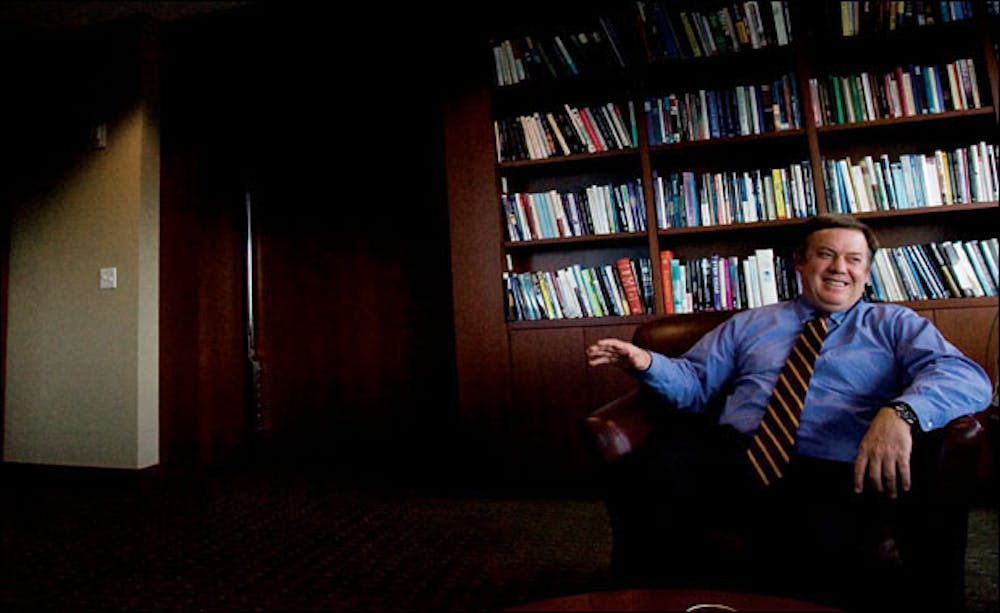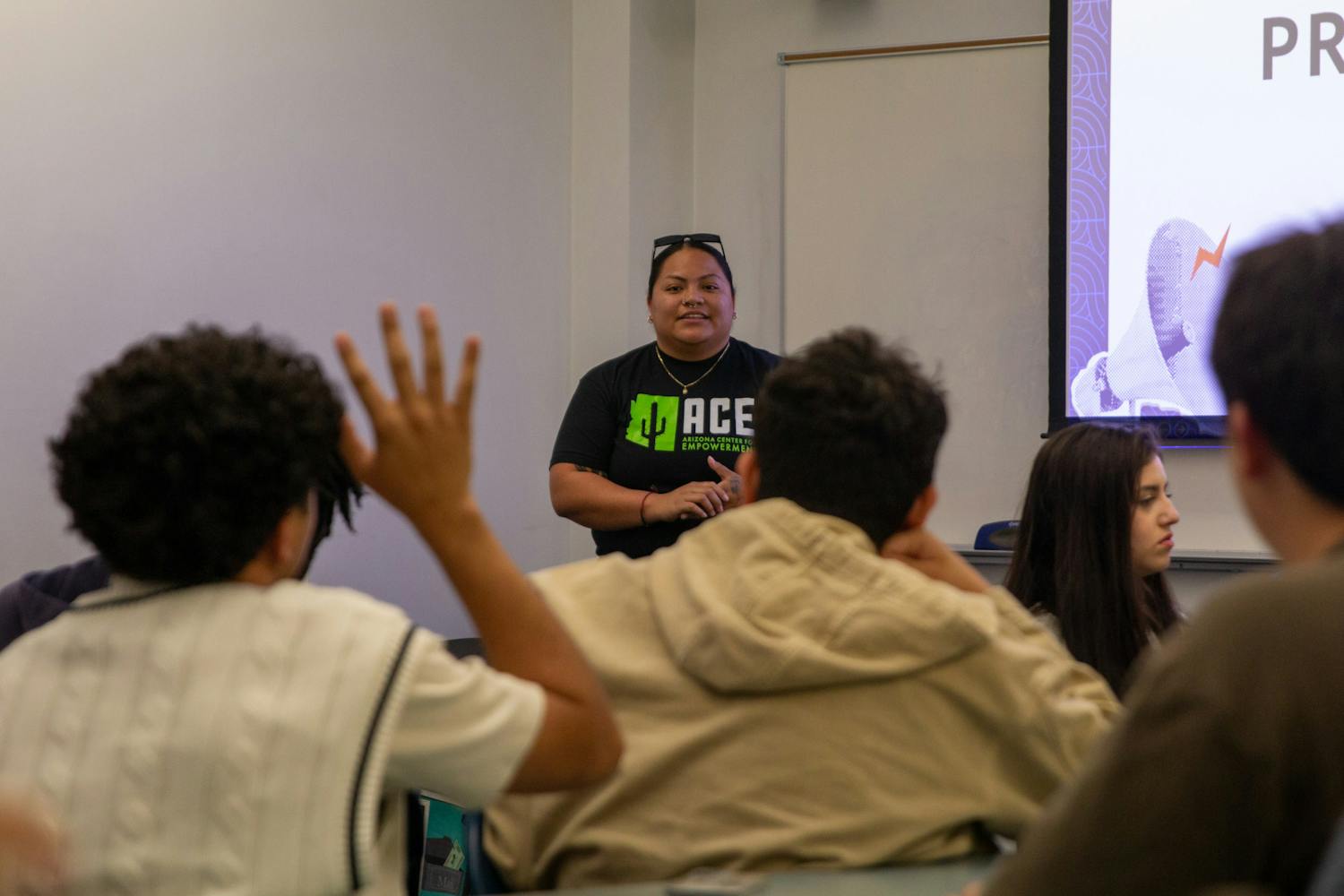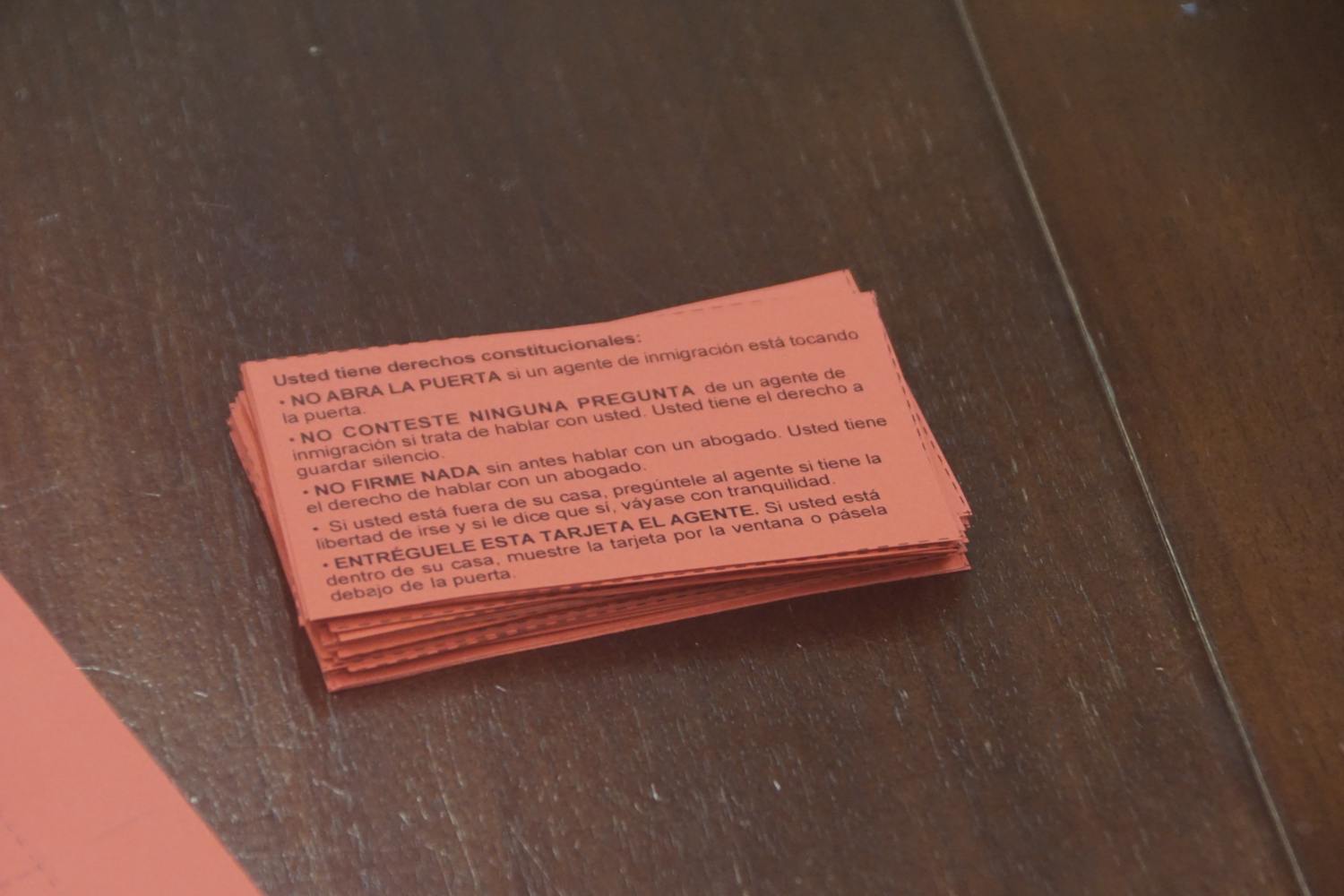The Tempe campus is still surrounded by the eerie quiet of night as President Michael Crow walks toward the already-lit Fulton Center, an inky black sky behind him.
Crow moves steadily, his pace neither rushed nor lagging, appearing to mentally prepare himself for the day with each step.
He unlocks the building’s main door with his Sun Card in one swift motion. The time is 6:48 a.m. on Wednesday, Jan. 27.
Setting the tone
Crow moves into his office, pausing to remove his suit jacket before settling into his desk.
The office is kempt, with neat stacks of papers and pens lining his desk among piles of class readers and textbooks. An analog clock labeled with time zones of major world cities ticks forward, a framed picture of the globe on the wall behind it.
Joyce Smitheran, Crow’s personal assistant, steps in from her connected office to announce the arrival of Crow’s 7 a.m. meeting, and he quickly moves to slide open the door to the adjoining conference room.
Within seconds he is greeting Johnnie Ray, president of the ASU Foundation and Ann Toca, the foundation’s vice president of communications and marketing, at the door.
The trio spreads sheets of paper across the table while discussing ASU Challenges, an initiative aimed at taking responsibility for the economic, social and cultural well-being of the community.
“I’m not an anxious person, but this project tells me: be anxious,” Crow says.
He uses a Christmas tree as a metaphor to explain potential issues that could cause the program’s branches to be weighed down. In their responses, Ray and Toca also bend their words to match Crow’s metaphor.
As the conversation evolves to the launch of a new Challenges Web site, Crow questions advancing technology.
“People want us to use all these technologies and then Twitter opens up and every interaction comes with a complaint,” he says. “[All weekend we were] engaged in the registration difficulties of a single student [and] you have to understand that if we get sucked in it’s really hard.”
The Challenges program will be an asset in advancing University fundraising, he says.
Ray nods in agreement. “We’re on the same page,” he says.
“I’m a brutal combat politician,” Crow says. “When we need to draw the sword, we’ll draw it.”
And with that, papers are packed back into folders and briefcases as the sky begins to grow pink behind dreary gray clouds.
Checking in
With only 15 minutes until his weekly Wednesday lecture course, Crow checks his e-mail, only scanning the messages’ subject lines.
Crow monitors one personal e-mail account himself — where he receives upwards of 250 messages a day — and his staff monitors a second, public account.
His two-screened computer becomes a blur of gray and blue text on one screen as he checks the day’s packed schedule, one that begins before the sun rises and ends long after it sets.
Crow’s calendar is completely booked nearly three months ahead of time, he says, and he usually has 75 to 90 meetings a week.
Huffington Post and CNN Politics headlines stretch across the second screen.
“I’ve already read all the newspapers this morning,” he says. Five to be exact: The Arizona Republic, San Francisco Chronicle, Washington Post, Wall Street Journal and New York Times.
Crow closes the computer windows suddenly, glances at his watch and picks up his jacket from its slouched position across an armchair — class begins in 10 minutes.
Head of the class
The conference room is just down the hall from his office and already packed with a wide range of students — honors undergrads to doctoral candidates — a mixture of T-shirts and flip flops, dress shirts and ties.
The 20-student course is a study of science, technology and public affairs focusing on themes of cancer and energy. Crow teaches the class with Daniel Sarewitz, a professor of science and society and co-director of ASU’s Consortium for Science, Policy, and Outcomes.
Today, Sarewitz is video-conferencing the class from Washington, D.C.
In the classroom, the students discuss assigned readings, and when Crow poses the first question from his seat at the head of the table, only one voice responds from the corner of the room.
The students address him as “Dr. Crow” but by this point in the day, it’s clear the people who surround him on a daily basis call him “Mike.”
Crow jokes with the group, his face flushing as he laughs with a wide grin. Two weeks into a class taught by the president of the University, the students’ laughter still seems mostly nervous and forced.
After 30 minutes, the students begin to emerge from their shells and become more comfortable, but Crow never loses his University-wide perspective.
He interrupts the speakers to spout statistics and facts from memory, his vast knowledge of the subjects at hand is obvious. He speaks less with his hands and more with his face, wide-eyed and passionate, a clump of hair plastering itself to his damp forehead. Hints of gray are starting to speckle the hair behind his ears.
He paces the room, peering over students’ shoulders at their laptop screens and thumbs through his BlackBerry with one hand.
As each new concept is raised, Crow stresses its connection to the University.
Teacher’s assistant Derrick Anderson, a public policy graduate student and former student in the course, said Crow as a professor is consistent, dynamic and challenging.
“Sometimes when he’s up at the front of the table, if I step back I’ll think, I could see him behaving this way if he was in front of the Legislature,” Anderson said.
The class is a priority to Crow, Anderson said, and he expects a lot from his students.
“When other people might stay overnight, he would take the midnight flight back to be in class,” he said. “Wherever he’s at in the world, he’ll use the videoconference technology to make sure he’s available.”
Nearly three hours have passed when Crow stands to excuse himself from class a few minutes before it officially ends to “catch a car” to have a meeting while en route to the Polytechnic campus.
“Next Wednesday am I in London or Washington?” he asks the group. “I forget.”
Addressing the crowd
Dennis DeConcini, Arizona Board of Regents treasurer, accompanies Crow on his ride to the Polytechnic campus, where he addresses East Valley leaders; there is no other time for the meeting.
Crow’s speech is well-rehearsed and he is poised as he recites the tenets of the New American University.
“We are not interested in tradition,” he says. “We are not interested in what other universities do.”
The crowd is visibly relieved when Crow goes over his plan for the Polytechnic campus — growth, growth and more growth — after budget cuts threatened the small Mesa campus last spring.
“There is no notion of a main campus anymore,” Crow says, as glossy pamphlets are spread across the room boasting Polytechnic facts in shiny maroon and gold.
The College of Technology and Innovation, recognized as the strongest facet of Polytechnic, has been nationally recognized for its innovative teaching methods, Crow says.
The speech ends with applause when Crow assures attendees the nearly-9,100 student campus is here to stay.
After shaking hands with countless officials, Crow breaks away.
“I’m starving,” he says, moving toward the buffet table just as staff members begin to clear it.
ASU senior vice president and University planner Richard Stanley arrives to ride with Crow back to the Tempe campus to discuss an upcoming ABOR meeting.
Mike the mentor
Back in Crow’s office, a visitor — this time a recruit from a private university in California — is ushered behind closed doors where the press is not allowed.
The meetings begin to back up; another guest is always waiting before Crow leaves the prior meeting.
He briefly meets with a business student he mentors to check in.
“[The student] contacted me her freshman year because she’s interested in going to grad school where I was [working] before,” he says.
Crow also mentors two President Barack Obama Scholars, freshmen George Khalaf and Joanna Chaparro.
“He gave me a dictionary and told me when I was in class and I didn’t know a word, to highlight it in the dictionary and learn it, to see throughout my whole college career how many words I highlighted,” said Chaparro, an elementary education student whose first language is Spanish.
Crow meets with Chaparro about once a month, she said.
“He gives me strategies that he used to do and I try to follow them,” she said. “I keep in contact with him … just in case I have a problem or need help with something.”
Khalaf, a political science and economics student who met both Crow and Obama at May’s University commencement ceremony, was one of the first six scholars to be selected for the program.
“[Crow] has helped me get anything I need to get,” he said. “I was on campus five days a week from beginning to end so he helped me get a meal plan.”
In their meetings, Crow emphasizes how he succeeded in college, the Mesa resident said.
“He stresses how important it is to go to the library and be well-read,” Khalaf said. “He’s extremely smart. The way he runs a university is the same way he deals with students.”
Crow says meeting with undergraduate students allows him to stay connected to ASU’s student body.
“It helps me to understand [what] kids born in 1990 think,” he says.
Political connecting
After a brief meeting with Elizabeth Capaldi, University provost and executive vice president, Crow emerges to attend the launch of the School of Politics and Global Studies, a Tempe-campus merger brought about by budget cuts.
Crow crosses University Drive on foot as students on skateboards and bikes glide past, typing on his BlackBerry and mumbling with Capaldi to verify the location of the event as he walks.
The crowded room quiets soon after he enters and Crow is among the first to address the crowd in the University Club.
“America is now but a part of the broader global context, with all that we bring to the table, … American political affairs and global political affairs are inseparable,” he says.
At the event’s reception, Paul LePore, associate dean for Student and Academic Programs in the College of Liberal Arts and Sciences, says he admires Crow’s leadership.
“Crow is the reason a lot of people come here,” he says, adding that he has been at ASU for just 13 months. “This is the only industry that actually operates that way.”
Crow snacks on a cracker as he walks back to his office, it’s now 4 p.m. on a day with little time for meals.
In the elevator, University staffers joke Crow is headed back to Batman’s lair.
“No car; no helicopter; no cape,” Crow jokes, eyeing missed calls and voicemails on his BlackBerry, explaining that two are from Congressional phone lines.
“I have spies in Washington,” he says.
No rest for the president
Crow settles back into his desk to return calls, lamenting the number of new e-mails that have arrived since noon.
For a few moments he rests his hand on his head and sighs as he listens to messages and leaves voicemails for leaders and policymakers across the country.
“I don’t sleep very much,” he says. “Sleep’s not a thing I crave.”
He is still clicking through messages when another guest arrives, Rufus Glasper, chancellor of the Maricopa Community Colleges.
When Glasper leaves, Crow’s office is aflutter as he debates whether to shift his evening schedule to make time for an appearance at an event at ASU SkySong in Scottsdale, pushing back a dinner and other meetings.
“[Whether I have time to go] depends on how fast I drive,” he says, and decides to go.
The appearance at the SkySong event — a celebration of University-funded student entrepreneurship ventures — is brief, and the group is surprised at Crow’s arrival.
Only 10 minutes after quickly addressing the room, he ducks out to get to his dinner meeting on time. He is rushed to get on with the day, one that is still far from over despite the setting sun.
At 6:30 p.m., as most other professional days are ending or over, Crow says he will spend the night returning phone calls and going over plans for another meeting after his dinner engagement. He promises to send an e-mail to signal the end of his workday.
Signing off
Denise Quiroz, director of communications for the President’s Office, said students have a misconception that Crow’s work isn’t his personal passion.
“The idea that ASU belongs to the public … is his passion. That is what he spends 20 hours a day doing,” she said. “He honestly believes there is nothing more important than offering quality education — that’s his dream.”
Crow’s energy, she said, is what keeps his staff going.
“That kind of progress doesn’t take a vacation,” Quiroz said.
And there are no vacations this night; Crow’s message arrives at 12:17 a.m.
“I am signing off,” he says.
Tomorrow has already begun.
Reach the reporter at tessa.muggeridge@asu.edu




